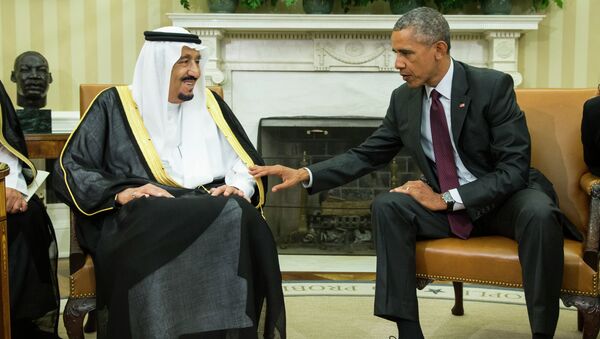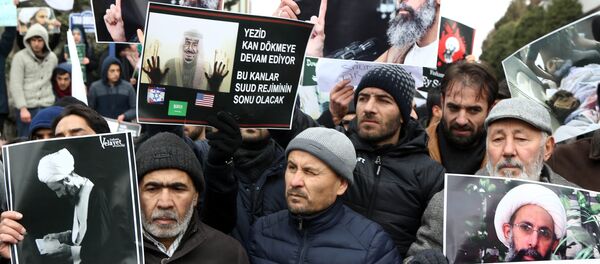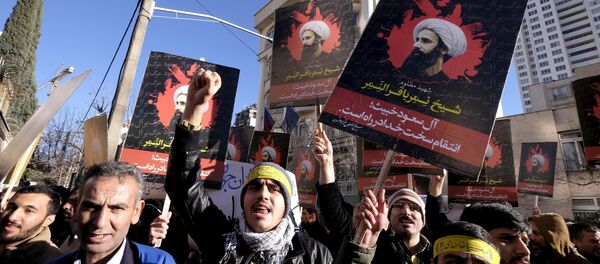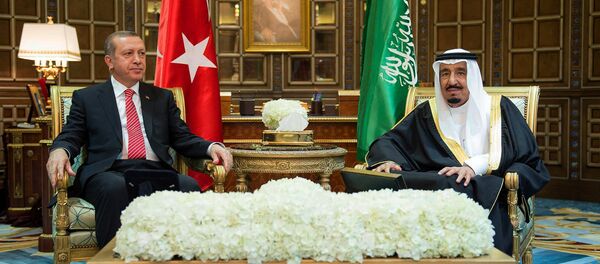Focusing on the Saudi-led coalition's war in Yemen, which has led to thousands of civilians killed and international condemnation, the analyst noted that for its part, Washington not only provided the Saudi coalition with targeting intelligence, but also offered coalition aircraft refueling assistance, "thus extending the range of their bombing."
"Yemen," the analyst writes, "is a small, poor, and insignificant (from the perspective of US vital interests) country just south of Saudi Arabia. It doesn't even produce much oil; but of course Saudi Arabia does –and that's why the Saudis are getting so much US support, despite Saudi Arabia's despicable foreign and domestic policies."
With Washington initiating military campaigns to oust undemocratic regimes across the Middle East "and loudly criticiz[ing] Iran's bad human rights policies," Eland notes that when it comes to Saudi Arabia, the US instead "mutes its criticism of [the country's] atrocious human rights record, sweeps under the rug that the 9/11 attackers were mostly Saudi nationals, and ignores that Saudi Arabia is the biggest exporter of militant Sunni Islamism by its support for radical schools around the Islamic world."
The answer, Eland finds, lies with the close ties formed between the US and the Saudi dynasty during the Second World War, "when Saudi King Abdel Aziz bin Saud traded US access to Saudi oil for US protection of that oil."
And with the US economy perceived to have become dependent on cheap and readily accessible Saudi oil, many have begun to fear that the US cannot afford to criticize Riyadh, and must provide it with its backing. This entrenched belief, according to Eland, is absurd.
"Although Saudi Arabia is the anchor of the Organization of Petroleum Exporting Countries (OPEC) oil cartel, the country does not have the control over the world's oil market that both policymakers and the public believe. OPEC, like most cartels, has failed to achieve long-term control over the price of its commodity."
Even the 1973 Arab oil embargo, which was initially believed to have brought the US to the brink of economic ruin, didn't really have as much of an impact on the US economy as the phenomenon of stagflation, "caused by poor US government economic policies," Eland explains.
The answer, the analyst notes, is that "similar to what brought about the fracking technology recently, higher oil prices in the 1970s just increased supplies – non-OPEC sources of energy were found and conservation practices became more prevalent. Finally, industrial economies are much more resilient to oil price hikes than is commonly perceived and have become even more so since the 1970s, because oil consumption accounts for a smaller percentage of developed nations' GDP."
With oil only serving as a "strategic" resource "when [it is] needed to power military forces in a war," and with the US producing "enough oil domestically to supply its military in a fairly large war several times over," it's high time, Eland suggests, for the US to wean itself of its embarrassing and dangerous alliance with the House of Saud.
"If the United States had a truly vital interest in holding its nose and supporting an autocracy like Saudi Arabia, that would be one thing. However, ignoring the despotic kingdom's oppression and likely international war crimes –in the erroneous belief that Saudi Arabia can successfully trump global market forces to manipulate long-run oil prices – is unnecessary, ethically questionable, and only increases the likelihood of blowback terrorism against the United States from the victims of Saudi aggression."






